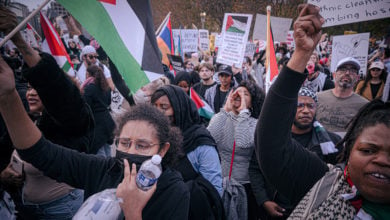On Dec. 31, District Judge Ricardo Urbina dismissed all charges against five Blackwater mercenaries who faced mandatory 30-year sentences if convicted of the slaughter of Iraqi civilians in Baghdad.
 |
There are thousands of private contractors operating in Iraq. Blackwater Worldwide, which has since changed its name to Xe Services, was contracted to guard U.S. diplomats in Iraq at the time. These corporations are reaping huge profits from the occupation while carrying out military operations with no accountability or oversight.
The killing spree took place in September 2007 at Nisour Square in a busy part of Baghdad. There is no dispute that the defendants—all former military personnel—opened fire on Iraqi civilians, using sniper rifles, machine guns and grenade launchers. Some victims were burned to death in the attack. The mercenaries said they acted in self defense after coming under fire, a claim that witnesses have denied. Seventeen Iraqis were killed, and at least 20 were injured in the onslaught.
The defendants, Paul Slough, Nicholas Slatten, Evan Liberty, Dustin Heard, and Donald Ball, were charged with 14 counts of voluntary manslaughter, 20 counts of attempt to commit manslaughter, and one additional firearms charge. Jeremy Ridgeway, a sixth Blackwater mercenary who was also involved, had already pleaded guilty to charges of killing one Iraqi and wounding another. It is unclear what impact the ruling will have on him.
Court documents showed that prior to the slaughter at Nisour Square, defendants had repeatedly shown contempt for Iraqis. Among other things, Slatten had repeatedly bragged about the number of Iraqis he had shot, and said that he wanted to kill Iraqis as “payback for 9/11.” Defendants had also previously thrown bottles at Iraqi civilians and fired guns indiscriminately, hoping to draw return fire.
Judge Urbina did not dispute the basic findings, but said that prosecutors had incorrectly built their case based on statements the defendants had made to State Department officials. Those investigators had promised the defendants that their responses would not be used against them in any criminal prosecution. The judge’s ruling, and the charge of improper prosecution, raises the possibility that the case was a charade from the start, never meant to bring about convictions.
Iraqis have responded with outrage at the dismissal of charges. Mahdi Abdul Khudor, who lost an eye and suffered other wounds in the shooting spree, said “I’ll be ready to reconcile with the Americans when they bring me back my eye.”
Another shooting victim, Abdul Waha Adul Khader, was quoted after Urbina’s dismissal of charges: “Why do they have the right to kill people? Is our blood so cheap? For America, the land of justice and law, what does it mean to let criminals go?”
Even the Iraqi regime, which has often been no more than a puppet administration serving the U.S. occupation force’s interests, has spoken out. Ali al-Dabbagh, an Iraqi government spokesman, said in a statement, “The Iraqi government will follow up on this issue in strength and resolution to bring those murderers of Blackwater to accountability.” He told the state television that the Iraqi government plans to pursue its own case against Blackwater in an Iraqi court.
The private contractors—of whom there are tens of thousands in Iraq—are an integral part of the U.S. occupation. General Ray Odierno, commander of U.S. forces in Iraq, spoke approvingly of the judge’s decision and dismissed concerns that killers can so easily evade justice, saying that “It’s a lesson in the rule of law.”
In fact, this case is a lesson in the rule of imperialist occupation. Those who carry out the worst brutality and repression against an innocent population whose country has been bombarded and occupied in the interests of a foreign ruling class will go unpunished in U.S. courts of law.






